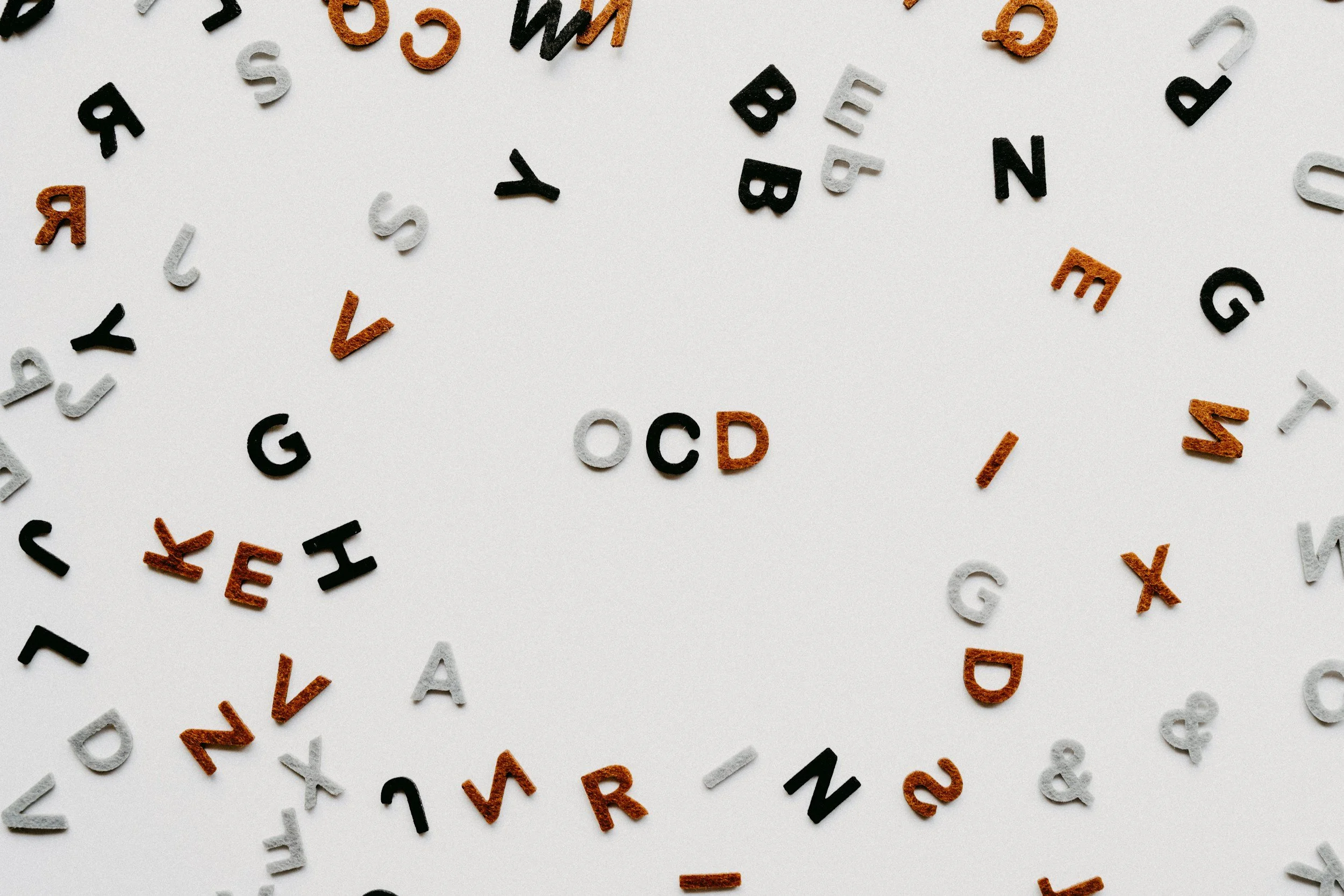Myths and Facts About OCD: Understanding Obsessive-Compulsive Disorder
I often hear a common response when I tell people that I am a therapist who specializes in treating Obsessive-Compulsive Disorder (OCD). It usually sounds something like this: “(a loved one) needs to work with you, they are so OCD,” followed by a laugh and a hand wave. If you have said this or heard this, I am not judging you. In fact, I have also said something like this at some point in my life before I was trained in working with OCD. There is a lot of misinformation in our culture, from movies to social media, that can make light of OCD and lead to a misunderstanding of what it really is and how much it can negatively impact people’s lives. I’m not writing to cast judgment or cause embarrassment. I’m writing to help bring awareness of what OCD is, common OCD misconceptions to look out for, and ways to support loved ones if they are experiencing OCD.
What is OCD? Definition and Symptoms of Obsessive-Compulsive Disorder
Obsessive-Compulsive Disorder (OCD) is a mental health disorder defined by someone who experiences obsessions and compulsions that take more than an hour from their day and cause them significant emotional distress and/or impaired functioning in significant areas of their lives, like work, home life, or social settings.
What are Obsessions in OCD?
Obsessions are intrusive and unwanted thoughts that are persistent, invasive, and repetitive. These thoughts often cause intense discomfort and distress when they occur, and can be images or impulses flashing through someone’s mind. These intrusive thoughts are what we refer to as ego-dystonic. Ego-dystonic thoughts are thoughts that are opposite to what someone values, believes in, and desires. Ego-dystonic thoughts and obsessions cause extreme distress and discomfort because they are so separate and opposite to who the person is. People with OCD often feel shame, horror, guilt, and anxiety related to these thoughts: “Why did I just think that?” “What’s wrong with me?” “Is this thought true? There must be truth to it if I thought it.” The distress felt at having these thoughts leads those who struggle with OCD to try to ignore, neutralize, or get rid of them with compulsions.
What are Compulsions in OCD?
Compulsions are repetitive behaviors or mental acts that someone with Obsessive-Compulsive Disorder feels compelled to complete in response to obsessions and intrusive thoughts. The purpose of the compulsions is to stop or reduce the anxiety or distress prompted by the intrusive thoughts, make the unwanted thoughts go away, or prevent a dreaded scenario from occurring. Compulsions are either behaviors or mental acts that are not connected to the obsession in a realistic way, or behaviors or mental acts that are clearly excessive in response to the thought or scenario.
Examples of some repetitive behaviors:
Excessive handwashing, bathing, grooming, or following a set of rules rigidly
Repeatedly checking outlets, locks, etc.
Repeatedly seeking reassurance from loved ones that you did something or didn’t do something
Avoiding triggers for obsessions and compulsions
Examples of some mental compulsions:
Praying the same prayer to prevent harm (to yourself or a loved one) or to prevent negative consequences
Counting to even or odd numbers or until it feels “right”
Repeatedly giving yourself reassurance that you did or did not do something, or that you do or do not feel a certain way about someone
Cancelling or neutralizing thoughts by replacing a “bad” word or thought with a “good” word or thought
Duration, Distress, and Impaired Functioning
Both obsessions and compulsions can cause immense pain and suffering. To be clinically diagnosed with OCD, the cycle of obsessions and compulsions will consume over an hour of someone’s daily life. Often, people with OCD experience both a loss of time in their day and impaired functioning in one or more essential environments to them.
Now that we know more about the seriousness of OCD, let’s review some common myths and facts about OCD and ways to support loved ones with OCD.
Myths and Facts about OCD: Separating Truth from Misconceptions
-
People who value and enjoy organization, tidiness, and cleaning do not have OCD. Someone with OCD feels compelled to excessively organize or clean in an attempt to make disturbing and unwanted intrusive thoughts or images go away. The obsession and compulsions are both unwanted and cause distress to the person experiencing them.
-
A lot of what someone with OCD goes through every day is unseen to those around them. The only thing loved ones and others can see is engagement in compulsive behaviors. This is what makes this myth so popular is because a lot of compulsive behaviors such as going back to check the locks, organizing, or cleaning are relatable to many. It is more accurate to say everyone has a little bit of anxiety from time to time.
Saying “I’m a little OCD” minimizes the experience and suffering that occurs for someone with OCD. The obsessions and compulsions they experience can take up to hours from their day and often negatively impact their home life, education or work on a consistent basis. OCD is more than quirky behavior, it is a clinical diagnosis that requires compassion, patience and support.
-
OCD can fluctuate in intensity throughout someone’s life. However, it is a complex disorder that requires professional support from a trained therapist and, at times, a Psychiatrist.
The obsessions and compulsions are not happening by choice to someone with OCD; they are intrusive and unwanted thoughts and behaviors, and without proper education and support from a specialized treatment team, symptoms can get worse over time.
-
Avoidance is a popular coping mechanism for OCD and anxiety because it works, in the short term! It provides temporary relief from anxiety and OCD symptoms.
However, in the long run, avoidance actually worsens symptoms of OCD and anxiety. It interrupts the natural process of allowing anxiety to run its course and come down on its own. Avoidance actually reinforces the OCD cycle and confirms to the brain that “this is dangerous, this does need to be avoided,” even though actual, real, and present danger is not present. Over time, avoidance can lead to increased intensity, duration, and frequency of symptoms.
-
OCD is not a one-size-fits-all disorder. Intrusive thoughts and obsessions can focus on many different topics and fears where there is uncertainty.
There are different themes of OCD, such as harm OCD, contamination OCD, health OCD, scrupulosity, relationship OCD, existential OCD, and perinatal OCD, to name a few. Even within the same theme of OCD, symptoms can present very differently for each person. I’ll explore each of these different themes in later blogs to help bring further awareness to them.
How to Support a Loved One with OCD
-
It is important first to understand what OCD is, how it affects the lives of people with OCD and their families, and to learn about helpful interventions for OCD, like Exposure Response Prevention (ERP) Therapy, which is considered the gold standard of treatment for OCD.
Increasing your understanding of what your loved one is going through can reduce feelings of helplessness and increase compassion for what they are experiencing.
-
OCD is very rarely something that will go away on its own. If you recognize your loved one struggling with OCD, encourage them to seek the help they need from a trained specialist. It can often be helpful for the family to join several sessions, as well, to learn more about OCD, ways not to accommodate OCD, and how to support your loved one at home.
-
Living with OCD can feel very isolating, even when people surround you. It is important for loved ones to validate their emotions and experiences, even if you do not understand them. This can look like “I understand that this feels real to you, and why that feels scary.”
For OCD, it is important to focus on the emotion rather than the content of the thoughts. To validate emotions, actively listen to their fears, name the feeling, and show understanding of how they could feel that way.
-
Change takes time, and going through ERP is difficult work. It is important to acknowledge even the small wins and celebrate them. This helps recognize the effort your loved one is putting into learning a new way to relate to obsessions and compulsions. This acknowledgment goes a long way in showing your loved one they are not alone, their effort is seen, and it matters.
-
It is important to remember to take care of yourself, as well. OCD doesn’t just affect the person going through it; it affects loved ones as well. It is okay to take breaks, time away for yourself, and to seek out support if you need it.
Just as it is important for your loved one not to feel alone, it is also important for you to have support. It is often hard to pour out care, compassion, and patience if our cup is empty, so make sure you set aside time to take care of your needs too.
Final Thoughts: Raising OCD Awareness and Reducing Stigma
Our culture has often misrepresented and characterized OCD, watering down its seriousness. This has often led to confusion on what OCD is, how it impacts someone’s life and the life of their loved ones, which makes it difficult to know how to support a loved one going through it.
OCD is a debilitating disorder for many that takes a lot of time and energy from those who struggle with it. OCD has a list of diagnostic criteria. It is not just about being clean and tidy. It does not look the same for everyone, and you cannot just stop the compulsive behaviors without support. It takes time to learn to manage obsessions and compulsions with effective, supportive care.
Loved ones of those struggling with OCD are vitally important to their treatment process. If you are a loved one of someone with OCD, it is essential to educate yourself about OCD and treatment for OCD. It is not solely your responsibility to support your loved one; it is vital to encourage them to get the support they need. Take the time to listen, to name their feelings, show understanding for what they are going through, and to celebrate the small wins along the way. Just as you take time to support them, take the time you need to care for yourself. This is not a sprint; it is a marathon.
If learning about the myths and facts of OCD resonated with you, don't hesitate to contact me with any questions or to set up a complimentary 30-minute consultation, where we will discuss your symptoms and needs to make sure we are a good fit to work together.
Until next time,
Lauren







